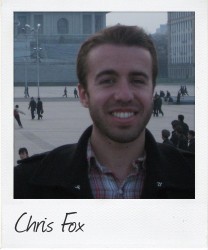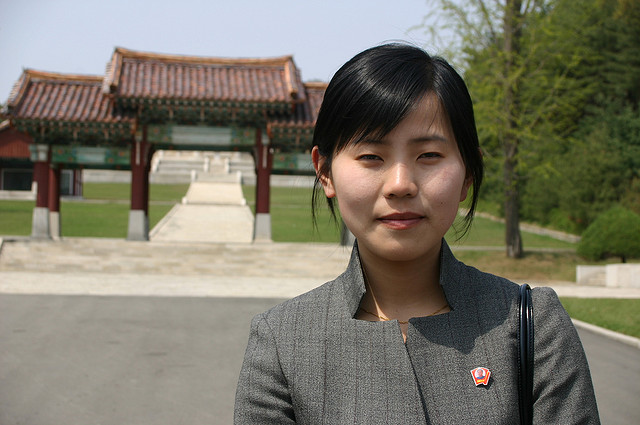“Looking behind North Korea’s charm offensive”
May 31st, 2013  In contrast to North Korea’s fiery international rhetoric, the public image it creates domestically is one of smiles and good vibrations, says Chris Fox, a Correspondent from Canada now living in Beijing. Behind the charm is a narrative with a different perspective.
In contrast to North Korea’s fiery international rhetoric, the public image it creates domestically is one of smiles and good vibrations, says Chris Fox, a Correspondent from Canada now living in Beijing. Behind the charm is a narrative with a different perspective.
“And what of the Princess of Canada?” my young tour guide inquires as our bus makes its way through the carless streets of Kaesong, North Korea.
“Do you mean Queen Elizabeth? Well, Canada and England are actually different count-…”
“Yes I know, the Commonwealth.”
With this, she frowns and takes out a small notebook of English phrases. After some searching she carefully pronounces: KATE MI-DUL-TON.
“Is she with child yet?” Truly some sentiments are universal.
Spending four conversation-filled days in North Korea during the lead up to the 100th anniversary of the birth of the Eternal President of the Republic Kim Il Sung, I had the opportunity to get acquainted with an elite group of North Korean society: its guides.
Those chosen to be tour guides to the trickle of tourists coming to the DPRK every year are carefully selected based on family background, academic performance, and, of course, appearance. These women are the face North Korea carefully shows to its visitors.
Graduating from elite schools, tour guides are not only allowed access to the internet and foreign media, they are required to watch foreign movies to grasp Western cultural references. Trained to engage the “unorthodox” thinking of foreigners, the guides I spoke to even had some access to foreign news outlets.
On the streets of Pyongyang they stick out from the crowds with their designer bags, brightly-coloured coats and high heels – brought from China by fathers who go there on official business.
In the workers’ paradise some are clearly more equal than others.
Guides are the kinder, softer side of North Korean propaganda. In contrast to the fieryinternational rhetoric, the image North Korea creates domestically is one of smiles and good vibrations.
For the foreign tourist, the majority of North Koreans you will actually encounter and have a chance to speak to – tour guides, waitresses, shop clerks, post clerks, guides at the various sights, receptionists and bartenders will all be pleasant young women. A charm offensive in tandem to the military one, they are perpetually ready to sing, play pool and smile sweetly.
Charm aside, these guides serve a purpose beyond explaining the history of the Kim Il Sung’s birthplace and ensuring visitors bow on the appropriate occasions. There’s a narrative here and the guides will make sure you hear it.
One’s outside understanding of the current situation on the Korean peninsula is turned on its head. There, a besieged North Korea is attempting to remain calm as “fanatical American imperialists” try to provoke war by test firing missiles and staging war games close to North Korean territory. “Wise leadership” keeps the country strong and independent in the face an American-led anti-DPRK conspiracy meant to “cripple the nation” through sanctions and sabotage.
Before arriving I had been warned against discussing politics. Yet within moments the guides’ first questions included: “Why I had come at this tense time?” “Was I not afraid of war?” “What did I think of North Korea?” and “What did I think of America?”
After four days of lengthy conversation, I am left with two general impressions: on certain issues, the guides are either ignorant or dishonest or both. Claiming that Kim Jong Un is the eldest son of Kim Jong Il (he is the youngest) or that all North Korean families have televisions (they do not) were clear examples of this.
Secondly, discussion of other subjects reveals an underlying legitimacy to the North Korean position that tends not to be taken seriously among outside observers. Take for example nuclear power. As one guide shared, on what basis can the U.S. – supporter of nuclear-armed India and Pakistan among others – dictate to any nation the terms of its use of nuclear material?
In the North Korean view, possessing nuclear weapons is both legitimate and necessary. Legitimate because the DPRK is a sovereign state and has the right to possess nuclear weapons in the same way that America, India or Pakistan do. Necessary, because the DPRK is still in a state of war and thus the U.S. military presence, and especially its war games, are seen as threatening.
It would be easy to dismiss the North Koreans I spoke to as brainwashed and their opinions as irrelevant. On some level I am sure this is true. One can only infer so much about a place after chatting with its tour guides. But the fact remains, a narrative of the current state of affairs exists in North Korea and to varying degrees is quite sincerely believed by most people there – and quite possibly by the leadership as well. We could do worse than to try and understand it.
If we take seriously the North Korean position of feeling besieged, then staging war games only serves to reinforce the North Korean narrative domestically while taking attention away from its economic and social problems. Likewise, if the DPRK views its possession of nuclear capabilities as valid and crucial to its national defense, rather than a bargaining chip to be given away for the right price, then a policy of engagement predicated on disarmament seems bound to fail.
In the end, what struck me most in North Korea was the normalcy of it. Despite everything, daily life goes on. Children roller-skate around Kim Il Sung Square, young girls giggle as they practice marching in front of the Tower of Juche, and on a bus somewhere in Kaesong a young tour guide learns the good news about Kate Middleton.
photo credit: Matthijs Gall via photopin cc
…………………………………………………………………………………………………………………
About me: I’m from a touristy little town in Canada. Now I live in Beijing. For most of what I could loosely call my adult life I’ve been fairly obsessed with Asia in general and China in particular. So, naturally enough, I’m interested in issues of development, authoritarianism and civil society. I also enjoy travel and 30+ hour train rides.
In the future I hope to work in the Foreign Service or some international body that does good things in interesting places.
…………………………………………………………………………………………………………………
Opinions expressed in this article are those of the author and do not necessarily represent the views of the Commonwealth Youth Programme. Articles are published in a spirit of dialogue, respect and understanding. If you disagree, why not submit a response?
To learn more about becoming a Commonwealth Correspondent please visit: http://www.yourcommonwealth.org/submit-articles/commonwealthcorrespondents/
…………………………………………………………………………………………………………………




